- Joined
- Oct 9, 2007
- Messages
- 47,252 (7.54/day)
- Location
- Hyderabad, India
| System Name | RBMK-1000 |
|---|---|
| Processor | AMD Ryzen 7 5700G |
| Motherboard | ASUS ROG Strix B450-E Gaming |
| Cooling | DeepCool Gammax L240 V2 |
| Memory | 2x 8GB G.Skill Sniper X |
| Video Card(s) | Palit GeForce RTX 2080 SUPER GameRock |
| Storage | Western Digital Black NVMe 512GB |
| Display(s) | BenQ 1440p 60 Hz 27-inch |
| Case | Corsair Carbide 100R |
| Audio Device(s) | ASUS SupremeFX S1220A |
| Power Supply | Cooler Master MWE Gold 650W |
| Mouse | ASUS ROG Strix Impact |
| Keyboard | Gamdias Hermes E2 |
| Software | Windows 11 Pro |
OpenSIL is an open-source CPU initialization framework project that seeks to replace on-chip initialization microcode, such as AGESA, across both client- and server processors. AMD looks to implement OpenSIL as it makes its AMD EPYC processors more friendly to large customers that want to take control of this aspect of the processor. Since its open-sourcing in June 2023, AMD has come up with reference motherboards implementing OpenSIL, as well as modifying a Supermicro server motherboard to the architecture, to demo at conferences. AMD firmware engineer Paul Grimes presented the company's progress with implementing OpenSIL, at the OSFC conference, in Germany. It's been known that AMD is targeting a 2025-26 timeline for OpenSIL to hit product, but AMD put out specifics, such as its next-generation "Venice" server processor supporting OpenSIL.
"Venice" is codename for an AMD EPYC server processor generation succeeding "Turin." It is built on the future "Zen 6" microarchitecture, and AMD could at least unveil the processor some time in 2025, if not mass-produce it. late-2024 thru 2025 could see the company ramp up "Turin" and other server processors implementing "Zen 5." That's not all, AMD plans to being OpenSIL even to client processors, with the generation of Ryzen processors based on "Zen 6." This will see the AGESA microcode replaced by a first-party firmware from AMD based on OpenSIL, which PC OEMs will be able to customize. The biggest impact of this change will be felt in the commercial notebook and commercial desktop segments, where large organizations can take greater control over the chip initialization firmware.
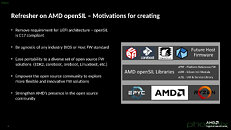
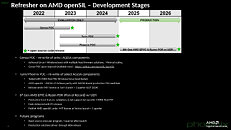
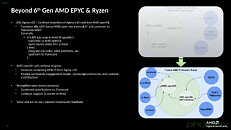
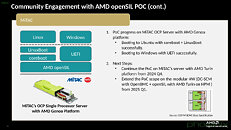
OpenSIL supports various industry-standard baseboard firmware standards, including the popular UEFI, Coreboot, and Linuxboot. AMD's OpenSIL libraries include xPRF a reference firmware for a given platform, xSIM, a silicon initialization module that is product-specific, and xUSL, which lets OEMs develop utilities and services for OpenSIL.
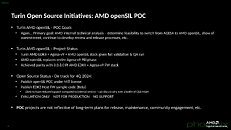
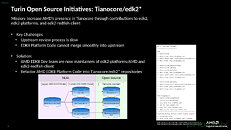
View at TechPowerUp Main Site | Source
"Venice" is codename for an AMD EPYC server processor generation succeeding "Turin." It is built on the future "Zen 6" microarchitecture, and AMD could at least unveil the processor some time in 2025, if not mass-produce it. late-2024 thru 2025 could see the company ramp up "Turin" and other server processors implementing "Zen 5." That's not all, AMD plans to being OpenSIL even to client processors, with the generation of Ryzen processors based on "Zen 6." This will see the AGESA microcode replaced by a first-party firmware from AMD based on OpenSIL, which PC OEMs will be able to customize. The biggest impact of this change will be felt in the commercial notebook and commercial desktop segments, where large organizations can take greater control over the chip initialization firmware.




OpenSIL supports various industry-standard baseboard firmware standards, including the popular UEFI, Coreboot, and Linuxboot. AMD's OpenSIL libraries include xPRF a reference firmware for a given platform, xSIM, a silicon initialization module that is product-specific, and xUSL, which lets OEMs develop utilities and services for OpenSIL.


View at TechPowerUp Main Site | Source






